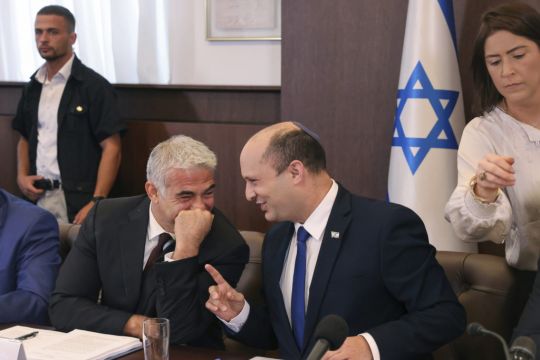Israeli prime minister Naftali Bennett opened his first Cabinet meeting since swearing in his new coalition government last week with a condemnation of the new Iranian president.
He said Iran’s presidential election was a sign for world powers to “wake up” before returning to a nuclear agreement with Tehran.
Iran’s hard-line judiciary chief, Ebrahim Raisi, was elected on Saturday with 62% of the vote amid a historically low voter turnout.
He is sanctioned by the US in part over his involvement in the mass execution of thousands of political prisoners in 1988, at the end of the Iran-Iraq war.
Mr Raisi has not commented specifically on the event.
Mr Bennett said at the Cabinet meeting in Jerusalem that “of all the people that (Iranian Supreme Leader Ayatollah Ali) Khamenei could have chosen, he chose the hangman of Tehran, the man infamous among Iranians and across the world for leading the death committees that executed thousands of innocent Iranian citizens throughout the years”.

Mr Raisi’s ascendancy comes at a sensitive time for the region, as Iran and world powers ramp up efforts to resurrect Tehran’s tattered 2015 nuclear deal with world powers, which granted Iran sanctions relief in exchange for curbs on its nuclear programme.
For weeks, Iranian and American diplomats have been negotiating a return to the accord in Vienna through European intermediaries.
Talks between the parties to the deal resumed Sunday, the first round since the election that put hardliners firmly in control across Iran’s government.
The landmark nuclear deal, which Israel opposed, collapsed after President Donald Trump unilaterally withdrew the United States from the accord in 2018.
That decision has seen Iran, over time, abandon every limitation on enrichment and Tehran is currently enriching uranium at its highest levels ever, though still short of weapons-grade levels.
Although the White House has yet to weigh in on Iran’s election, President Joe Biden’s national security adviser, Jake Sullivan, said on Sunday that the outcome was unlikely to affect nuclear negotiations because Iran’s Supreme Leader, Ayatollah Ali Khamenei, wants the deal restored.
“The person who makes the decision about whether Iran will go back into the Iran nuclear deal, will assume its nuclear obligations under international law, is not the president of Iran, it is the supreme leader of Iran, and that person did not change from before the election,” Mr Sullivan said on CNN’s State Of The Union.
From Israel, Mr Bennett said Mr Raisi’s election as Iranian president was “the last chance for the world powers to wake up before returning to the nuclear agreement and to understand who they’re doing business with.
“These guys are murderers, mass murderers: a regime of brutal hangmen must never be allowed to have weapons of mass destruction that will enable it to not kill thousands, but millions,” he said.

Israel has long stated that it opposes arch-enemy Iran’s nuclear programme and said it would prevent Tehran from obtaining nuclear weapons.
Iran insists its nuclear programme is intended for peaceful purposes.
Earlier this month, Israel’s outgoing Mossad intelligence chief signalled that Israel was behind a string of recent attacks targeting the country’s nuclear programme.
Mr Bennett heads a broad coalition of parties ranging from Jewish ultranationalists to liberal factions and a small Islamist party.
His government convened its first Cabinet meeting since it was sworn in last week, ousting long-time prime minister Benjamin Netanyahu from office and sending him to the opposition for the first time in 12 years.







